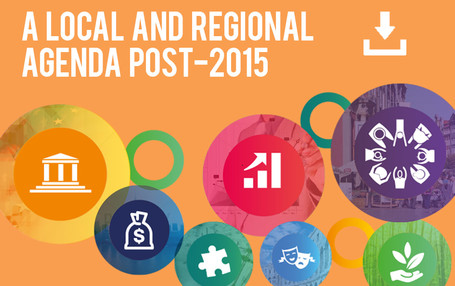
Source: By David Horpe, Community Manager at Sustainable Cities Collective
A new tool has been produced for local and regional governments to contribute to the post-2015 Agenda and the New Urban Agenda of Habitat III in 2016.
It is the creation of UCLG, the Global Network of Cities, Local and Regional Governments, an organisation that represents the interests of local governments on the world stage, regardless of the size of the communities they serve.
Around the world local and regional governments are building their own Global Agendas to reflect their concerns, priorities and begins. As part of a global task force, UCLG is doing the same thing to address the post-2015 agenda moving towards Habitat III. The focus is to generate a consultation process to find common ground on development issues that provide local solutions to global challenges.
The purpose of the tool is to help facilitate this bottom-up interactive debate in advance of Habitat III,which will be the third United Nations Conference on Housing and Sustainable Urban Development, due to take place in 2016 (they happen every 20 years). It will be one of the first global conferences after the Post-2015 Development Agenda is set. It is an opportunity to discuss and chart new pathways in response to the challenges of urbanization and the opportunities it offers for the implementation of the sustainable development goals.
Since the last Habitat conference city governments have emerged as drivers of change, leading from the bottom up on climate change mitigation, the empowerment of women, local economic development and social and cultural inclusion.
The ultimate aim of the consultation process is, in the UN's own words "to generate a 'New Urban Agenda' for the 21st century which recognizes the ever - changing dynamics of human civilization".
The UCLG's contribution, this tool, begins with its manifesto, The city of 2030 – Our Manifesto, which lays out local and regional governments’ vision of a more sustainable urban future:
"a democratic, self-governing city with a strategic plan for its future; an inclusive city based on the participation of all its inhabitants; a liveable city with universal quality public services and infrastructures; a creative city which constantly inspires and nurtures creativity and innovation; a secure and peaceful city; a city for work; a city without slums; a cleaner, greener and more compact city; a city who share responsibilities and cooperate with other municipalities and strength its partnership with other levels of governments."
The tool invites contributions under the following headings: governance; financing; planning; inclusive cities; environment; economic development; and culture.
Under governance, the Habitats Agenda calls for an 'enabling environment' characterised by the decentralization of responsibilities and resources to local governments according to the principle of subsidiarity, for civil society participation, for the use of partnerships, including with the private sector, and for the capacity-building of those involved in decision-making and urban development policy.
Click here to read full history










